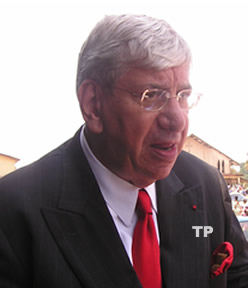
Jacques Paul Klein's Message to the International Workshop on the Reconstruction of the University of Liberia
Held at the
University of Pennsylvania, Philadelphia
21 and 22 April 2005
The Perspective
Atlanta, Georgia
April 26, 2005
 |
|
Jacques P. Klein
|
The University of Liberia suffered severe damages caused by civil conflict and years of neglect. During the fighting for control of the capital, the whole institution was thoroughly looted; stolen were desks, chairs, computers, doors and every other removable item and even the power cables and sanitary fittings were not overlooked. The law library was stripped of precious books and reference materials. Consequently, it will take quite some time before the University will completely recover.
Despite these conditions the staff of the institution is putting forth tremendous effort to ensure the resumption of normal academic activities. At the same time, the students are enduring remarkable difficulties to continue their studies, having to cope daily with insufficient transportation, poor basic facilities, and widespread lack of education materials. Their endurance cannot be underestimated: this new generation has shown a willingness to change the course of their future, regardless of the painful experience of the past.
This challenging endeavor deserves to be supported
not only for the prestige and importance of the University
for the country and for West Africa, but also for
the fact that it contributes to the current peace
process. During the civil conflict, countless professionals
and technocrats were killed, including several members
of the academic and support staff of the University
of Liberia. Many other qualified people left the country
in order to seek refuge abroad. Consequently, the
scarcity of competent human resources is having a
negative
impact on the present reconstruction effort in Liberia.
Therefore, only steady support of the higher education
sector can tackle this issue.
Nevertheless, this is not the only reason to support the University of Liberia. This institution has to become the nucleus of a national theoretical reflection on the factors that brought the country to war, and on the best ways to recover. And it is evident that a true country-wide discussion cannot happen without having at its core the most important academic establishment. Sustaining higher education is not directly a part of the UNMIL mandate. However, considering its importance, UNMIL approved three Quick Impact Projects to address some basic needs on the main campus. Nonetheless, compared to the current needs of the institution, these efforts fall far short of whqt is really required.
The University of Liberia is currently open for classes but faces great problems in guaranteeing acceptable teaching standards. For this reason, the administration recently launched a series of national initiatives that unfortunately, due to the poor state of the economy, failed to gather enough resources for a rapid restoration of the University to its previous glory.
Therefore, I ask for a major effort on the part of all of you gathered here today. Any contribution will go a long way not only to boost the morale of the teaching staff and students, but above all, to help rehabilitate one of the former renowned institutions of West Africa, to assist a vital element of the peace process and to improve the future of Liberia.
Despite the many challenges, peace has a chance to stay in Liberia.
God Bless you for what you are doing for Liberia and God Bless Liberia.
